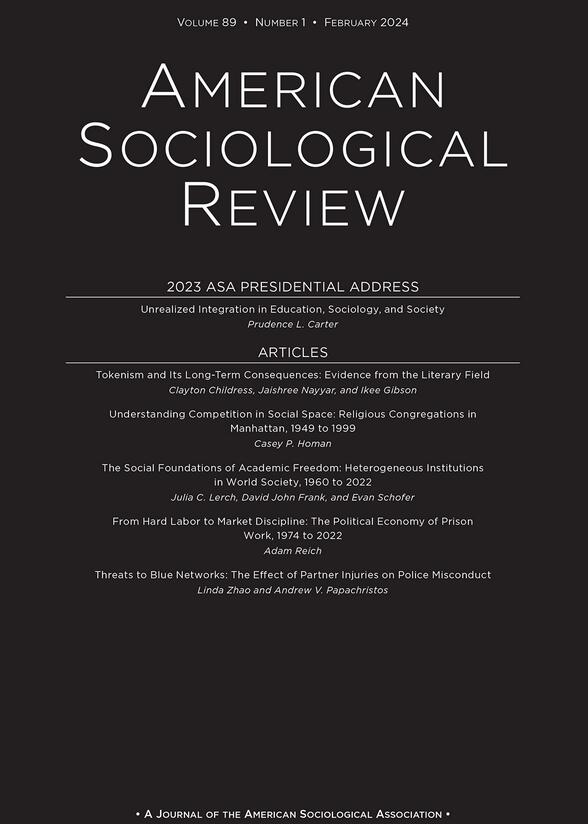Relative to Whom? Comment on “Relative Education and the Advantage of a College Degree”
IF 6.2
1区 社会学
Q1 SOCIOLOGY
引用次数: 2
Abstract
To understand the relative advantage of a bachelor’s degree, we must consider the question: relative to whom? Using the Current Population Survey Annual Social and Economic Supplement, Horowitz (2018) argues that educational expansion between 1971 and 2010 decreased college graduates’ skill usage and eroded their advantages relative to individuals without a postsecondary degree. However, the comparison group—individuals without a postsecondary degree—is inconsistently defined over time due to a change to the CPS in 1992; this group also includes individuals without a high school degree, high school graduates, and people with some college but no degree—three groups that have heterogeneous labor market experiences. I replicate Horowitz’s analysis and repeat it using two alternative education categorization schemes that address these limitations. I show that college graduates’ absolute and relative advantages in skill usage depend substantially on how we measure education. Notably, I find that college graduates maintain persistent relative advantages in skill usage when compared to high school graduates and individuals with some college, even as education expands. Although no classification system perfectly accounts for the full variation of the population, my findings demonstrate that researchers must carefully define key variables and comparison groups, especially when considering relative effects.相对于谁?评“相对教育与大学学历优势”
要理解学士学位的相对优势,我们必须考虑这样一个问题:相对于谁?Horowitz(2018)利用《当前人口调查年度社会和经济增刊》(Current Population Survey Annual Social and Economic Supplement)认为,1971年至2010年间的教育扩张减少了大学毕业生的技能使用,并侵蚀了他们相对于没有中学后学位的个人的优势。然而,由于1992年CPS的变化,随着时间的推移,对照组——没有中学后学位的个人——的定义不一致;这一群体还包括没有高中学历的人、高中毕业生和有大学学历但没有学历的人——这三个群体的劳动力市场经历各不相同。我复制了霍洛维茨的分析,并使用两种解决这些局限性的替代教育分类方案重复它。我表明,大学毕业生在技能使用方面的绝对优势和相对优势在很大程度上取决于我们如何衡量教育。值得注意的是,我发现,与高中毕业生和一些大学毕业生相比,即使教育程度有所扩大,大学毕业生在技能使用方面仍保持着持续的相对优势。尽管没有一个分类系统能完美地解释人口的全部变化,但我的发现表明,研究人员必须仔细定义关键变量和比较组,尤其是在考虑相对影响时。
本文章由计算机程序翻译,如有差异,请以英文原文为准。
求助全文
约1分钟内获得全文
求助全文
来源期刊

American Sociological Review
SOCIOLOGY-
CiteScore
13.30
自引率
3.30%
发文量
35
期刊介绍:
The American Sociological Association (ASA) is a non-profit membership association established in 1905. Its mission is to advance sociology as a scientific discipline and profession that serves the public good. ASA is comprised of approximately 12,000 members including faculty members, researchers, practitioners, and students in the field of sociology. Roughly 20% of the members work in government, business, or non-profit organizations.
One of ASA's primary endeavors is the publication and dissemination of important sociological research. To this end, they founded the American Sociological Review (ASR) in 1936. ASR is the flagship journal of the association and publishes original works that are of general interest and contribute to the advancement of sociology. The journal seeks to publish new theoretical developments, research results that enhance our understanding of fundamental social processes, and significant methodological innovations. ASR welcomes submissions from all areas of sociology, placing an emphasis on exceptional quality.
Aside from ASR, ASA also publishes 14 professional journals and magazines. Additionally, they organize an annual meeting that attracts over 6,000 participants. ASA's membership consists of scholars, professionals, and students dedicated to the study and application of sociology in various domains of society.
 求助内容:
求助内容: 应助结果提醒方式:
应助结果提醒方式:


